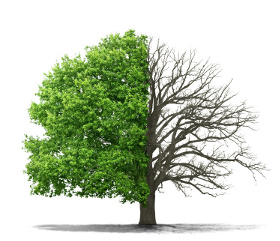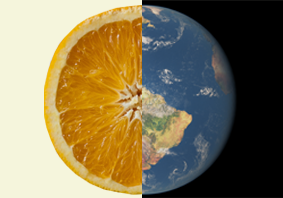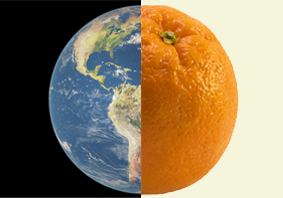The apostle on the rotting orange
When Jesus in 1974 and then the Father in
1977 spoke in Arès, who among us could see that he or she would
be an apostle some day?
None of us.

Now we are apostles looking for the human
beings able to be penitent and make up for Adam's
mistake (Rev of Arès 2/1-5).
The Revelation of Arès has not founded any religion. It
has revived the apostolic life. Apostles have disappeared,
because they adapt to life and all its ups and downs, eventful
times, whereas religion transfixes, rigidifies, mummifies (Rev
of Arès xLix/7).
Whoever opens his or her mind wide at the tourist
brochures world realises that its is just some trompe l'oeil,
a tree half live and half dead or a big orange still wholesome
outside, but tainted inside.
On the world, the rotting orange, man has closed his hand, man
who has changed into its master (Rev of Arès 18/1)
cunning (15/1), miserly, irritable, though free (10/10),
instead of the generous Genesitic Master (18/3). The
Arès Pilgrims, who are still too few, try hard to pass between
the sinners' fingers held tight so that they may
save the orange inside.
The apostle is the one that works salvation,
he or she opens the gate to Life (24/5).
 The world is a rotting orange.
The world is a rotting orange.
On its skin, which is still good-looking, the pearly golden snails
of religion and politics have been crawling this way and that in
the slobbering wake of their predecessors. They call their slobber
Order, which in reality is just disorder, because I have always
heard speeches which state that Order has to be restored, so I
have some reason to think it is never established.
We are apostles in the street. How can we draw tainted ears'
attention, brains without Life juice? Human beings
survive rather than they live, but they are unconscious of it.
They are proud of being creators, but blind to the fact that
Paris, New York or Tokyo in their illusory magnificences are
poor, sad, fragile by comparison with the continuous perpetual happiness
that is to be aimed at. The most magnificent cities and museums
(Rev of Arès xxxvi/23) under the very splendidest sun, that
they think are the most brilliant things, are just potential dirty
dust, latent ruins (Quran "The Spider" 29/35) in the Universe.
Open your eyes wide! You are just the sorry remains of a forgotten
transcendence. Grandeur hunters cannot see that the sublime human
creature is not awaken as long as Earth is just a graveyard, a
ground which swallows dead flesh up, generations who live for a
few decades at the very most just as midges live for a few hours.
Man is unable to understand that in a lifetime cut that short, sin
makes it naturally impossible to restore Life (Rev of Arès
24/5) through lack of time, and that the world is only just
a mere shadow of what the Father once got out of the chaos
(Genesis 1/2), and that he has to force his way into time
by being penitent, if God would not have reminded of it.
The world as an orange is rotting.
Centuries have not encroached on the Universe, which
goes on whirling round the space, but they have dried up Eden.
Only the apostle on a dirty sidewalk, holding leaflets in his
hands, knows it. He is as insignificant as the spot, but he is
aware of forgotten Happiness.
How can one tell men about their unhappiness? How can one tell
worms about their wretchedness? They are forever laughing in
the rotting orange, which they think is their paradise. Neither
gardeners nor environmentalists can give back Earth its cachet
forgotten, erased ever since sin began rotting everything. Nothing
sublime any more in the spoiling flesh; very few angels still
happen to venture between the fibers or peeps and God. "God is
dead," said Nietzsche, who did nothing but state what he could not
see any more. He could not see but the world where we are aging,
suffering, dying, killed by age, illness or... man. Whether man
kills us in the war or on a road, or whether age kills us later,
it's the same. Even Beauty (Rev of Arès 12/3) fled
together with Adam end Haouha (Eve). Admittedly we can
still see Beauty in Good, but who does Good
though? Today Good is mistaken for humanitarism,
welfare, that is, solidarity, that is a different matter
altogether like the counterweight just heavy enough to
counterbalance the weight. Good is different, it surpasses all,
all is transfigured by it, but what makes it even better is that
all of men can do it. But mankind is unaware of that.
Science and technology make people think they conquer evil just as
a mirror lures skylarks into believing the trap is Eden.
Barbarians are still here, nevertheless. It is only just seventy
years since Nazis used to slaughter Jews, Gypsies, Poles, Russians
by the million. Do you think it's over? No, it's not. The
slaughter is going on smoothly, but it may turn spectaculat at any
time again, maybe tomorrow.
An apostle reminds men that real happines might be back
by starting and keeping on being penitent resolutely (Rev of
Arès 28/25). It will necessarily take more than four
generations (24/2). How many generations in
addition? Ten, twenty or thirty generation will not be too
much after millenaria of evil and , but humans are continuously in
a hurry; they want everything right away like quivering excited
dogs, which wag their tails and prick up their ears at the foot of
the table, waiting for leftovers.
Fellow humans don't you believe that our apostolate is but a
backward observance! Abraham, Isaiah, Buddah, Jesus, Muhammad are
men of a recent time. Their message has not yet been achieved
so that real piety (Rév of Arès 35/6) has not
yet come into existenc, but meanwhile the orange and Earth is
rotting in man's hands. The Father has returned to the Earth in
Arès, 1974 and 1977, and spoke to man, because the rotting is
being on the increase and the sin of sins (38/2) begins
to show its dark shape in perspective.
Apostolate is penitence
plus the penitent harvest, the only way out.
 Why
is the orange and the world ruined by human worms, who are not
stupid, far from it ! but who are made like Ferraris powerful and
highly technological to belt along, but not to ride a long way.
The only thing is we have to come back from far away and go a long
way.
Why
is the orange and the world ruined by human worms, who are not
stupid, far from it ! but who are made like Ferraris powerful and
highly technological to belt along, but not to ride a long way.
The only thing is we have to come back from far away and go a long
way.
We do not judge the human worms that spoil the orange — you
shall judge no one (Rév of Arès 36/16) —, but we fail to
understand why they are blind to the fact that politics has never
met
-
the need to conquer evil (23/1), misfortune (2/18), distress (23/3) and achieve (35/6) Good (12/3, xxxiii/11),
the need for love (7/5), that crushes nastiness and greed,
the need for forgiveness (12/4), that crushes the barbaric spirit of revenge,
the need for peace (28/15), that crushes violence,
the need for spiritual intelligence (32/5), that crushes damage from highbrow intelligence,
the need to be free (10/10), that crushes constraint and idiotization ?
and why they are blind to the fact that only
spiritual life, which The Revelation of Arès calls penitence,
can meet those needs, even though it can be restored in man and
become active only very slowly (24/2).
Never let it be said that we are merciless towards rhe human
worms! Let us hope they understand that they are destroying the
orange that bears them, like vessels would drink the Sea
Which bears them. All those things that novels, movies, theater
plays have forever been searching each one more harder than the
other. Tragic is the passiveness of the human being in front of
Evil, over which he or she cries at the time, and that's for sure,
but about which he or she forgets shortly. In 1950 people had
forgotten the 50 million casualties in 1939-1945. The world's lot
is a big tragedy of blindness more than anything, because Adam
turned down God's Plan in all conscience, but everybody
really give a damn about it in all unconscious today. Sin has not
prevented man from keeping highbrow intelligence and cunning, but
it has made man a worm blind (Rév of Arès 16/15) to the
Light like the specters which I saw filing past
me, which clung on to each other like blind people, on November
27, 1977, between my house and the chapel where God was awaiting
me. The human worm without any doubt has stayed
incomparably superior to the vast animal kingdom, but it is
absolutely short of all the possible means to be the God
(2/13) of Earth, whom it aspires to be. We apostles have
the duty to provide it with them, if it wants to get them, of
course. The sin of sins (38/2) is threatening to happen
; never has apostolate been more urgently needed.
We cannot use communications by the media. We are denied
admittance to the media, so that being lacking in media in a time
when the world is overquipped with media is distressing, and we
think of Seneca's statement, "Being destitute among rich people is
the worst destitution." But would the media give us an advantage
really? We as apostles miss means compared with the means that
religion, politics, industry and trade have at their disposal, but
we have the powerful will to change the world (Rev of Arès
28/7) and we are aware that Good is built up by
the will but neither by movie cameras, nor by newspapers, nor by
mixing desks.
The Sea on the Hights is by now our element as well as
our purpose. It shimmers in plain view of the soul.
Whatever street I walk along I can see its "silvery glints" like
those Trenet used to sing, and the angel that has continuously
accompanied me is the specific thrill of my heart which beats in
unison with the Father's Heart. One of our peculiarities is our
special hostility towards Evil. This peculiarity is uncommon and
strange in the world, which cannot consider Evil but as a problem
yet unsolved but bound to be solved very shortly, just as
religious, political speeches have been saying again and again. We
Arès Pilgrims are not fit for swallowing the assertion that
technology makes "miracles". I underwent open-heart surgery in
2014, but they did not do anything but postpone my inevitable
death a few years. Man sends devices and vehicles onto Mars. Big
deal! How many suffering people tormented by Evil on Earth in the
meantime? Billions of them uninterruptedly replaced by myriad
births, the births of miserable suffering people to come.
We would use technology, if we could have it, but we anyhow will
be successful in proceeding without it. After all, science is
useful, but it is our foe as well, because it has given mankind
numberless predators. Notably and preeminently death. I am going
to die as an old fellow, but what have I really made in my own
lifetime? Altogether not much and already quite something.
Already quite something because I have opened up the path
to absolute Good: the soul, but my life will
be too short, I will be lacking in time, so my personal action
will boil down to nothing much. The only thing is I have started
preparing the future generations for the very long apostolate they
are destined for.
Men consider death as natural, whereas it is nonsensical after the
flesh has lived as swift as a sigh, but with a mind
that is able to think back to millennia in the past or in the
future. This is a dreadful contradiction, which demonstrates the
inanity of death. It is the soul that enables man to
throw a bridge across that tragic discrepancy. We as apostles run
counter to what people guffaw against mockingly, people all bound
to pass away tomorrow. When do we have our backs to death? It is
uncomfortable to tell the person you meet in the street,
"Remember! Only penitence can make you live on in the Light."
Few people listen to us, only a few of them spurred on by
expectations, the mature spirits. On the other hand, how
many people strain their ears by halves and then run away so as to
take refuge from us in some illusory isolation where sufferings
and death will some day catch them.
The wise follow us, they are very uncommon in the senseless world,
some men and women who cannot care less about being mocked, and
who prefer contemplating the Light to being entertained
by television or Walkman. When will they be aware like Beaudelaire
that nothing is deadly duller than entertainment?
Bitter is the juice of the rotting orange, that is, the world on
which powers have a tight grip.
Yes, bitter! So most people think that a rotting orange never
regenerates and keeps on rotting inevitably, but man in his hands
does not hold an orange, but the orange, the orange that is
interminably reborn of the bud, of the flower, of the tree sap.
The tree with its forever and ever green top (Rev of Arès
xvi/13), which a penitent is, never dies; its
fruit is forever latent in it.

Xxxx xxxx xxxx
Signature
Reply :
Xxxx xxxx xxxx
XXxxxXX 187USC2
Xxx xxx xxx xxx xxx
Signature
Reply :
Xxxx xxx xxx xxx xxx
00xxx00 187CXX
Xxxx xx xxxx xxx xx x xxxxxxxx xxx xxxxx xx xxx.
Signature.
Réponse :
Xxxx xx xxxx xxx xx x xxxxxxxx xxx xxxxx xx xxx.